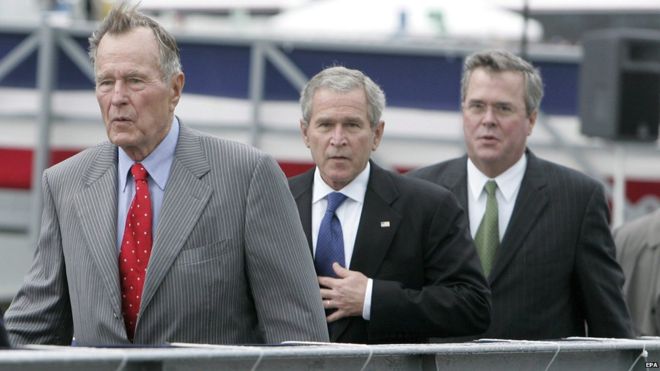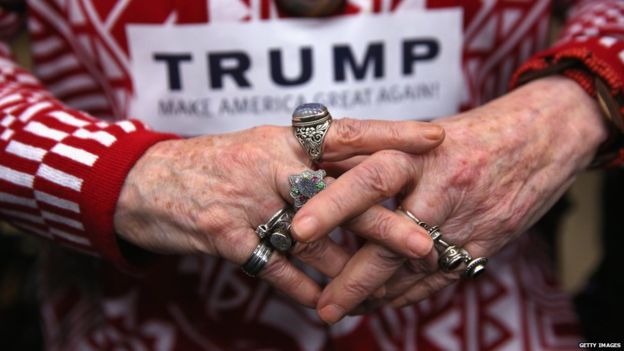Former presidents will not endorse Trump

Former US presidents George H W Bush and George W Bush will not endorse Donald Trump's candidacy for president, aides have told local media.
This marks a first for the 91-year-old former president Bush, who had endorsed Republicans in the past five elections.
Republican politicians are struggling to define their support, or lack thereof, for Donald Trump.
Mr Trump's remaining opponents dropped out earlier this week leaving him as the presumptive Republican nominee.
Both Bush men had previously campaigned this year for former Florida Governor Jeb Bush, who exited the race in February.
They had each supported past Republican presidential nominees John McCain in 2008 and Mitt Romney in 2012.
Although neither former president has openly attacked Mr Trump or his policy proposals, George W Bush made a veiled criticism at a campaign event for his younger brother saying, "The strongest person usually isn't the loudest one in the room".
"I understand that Americans are angry and frustrated. But we do not need someone in the Oval Office who mirrors and inflames our anger and frustration," George W Bush told the South Carolina audience.
Top Republicans divided over Trump
Supporting:
New Hampshire Senator Kelly Ayotte
Retired neurosurgeon Ben Carson
New Jersey Governor Chris Christie
Former Louisiana Governor Bobby Jindal
Senator Majority Leader Mitch McConnell
Nevada Governor Brian Sandoval
Not supporting:
Former President George H W Bush
Former President George W Bush
Former Massachusetts Governor Mitt Romney
Nebraska Senator Ben Sasse
Yet to comment:
Former Florida Governor Jeb Bush
Texas Senator Ted Cruz
Ohio Governor John Kasich
Florida Senator Marco Rubio
Wisconsin Governor Scott Walker
Many Republican candidates for lower offices are concerned about running on the same ballot as Donald Trump, who has alienated minority voters through his rhetoric about building a wall with Mexico and banning US entry to Muslim travellers.
Many American choose to vote for either the Democrat or Republican Party, rather than weighing the individual candidates.
Republican representatives fear that voters who oppose Trump may eschew the Republican Party all together.
John McCain, who is running for his sixth term as senator for the state of Arizona, privately told donors that he will face a tough re-election campaign sharing a ballot with Trump.
"If Donald Trump is at the top of the ticket, here in Arizona, with over 30 percent of the vote being the Hispanic vote, no doubt that this may be the race of my life," the former candidate said according to audio obtained by Politico on Thursday.
Hours after Mr Trump's remaining rivals dropped out, the Democrat frontrunner Hillary Clinton released a campaign ad seeking to take advantage of the vitriolic language and insults that other Republicans have used to refer to Mr Trump.
In her tweet to share the video, Mrs Clinton wrote "Republicans agree: Donald Trump is reckless, dangerous, and divisive."
Some Republicans, including a former top adviser and speechwriter to Senator McCain, have begun to openly call for the party to oppose the presumptive nominee and to work to independently elect a conservative candidate, such as Nebraska Senator Ben Sasse, who has indicated that he will not be supporting Mr Trump.
In a series of media interviews following Mr Trump's emergence as the sole remaining Republican candidate, he has described his vision for the first 100 days of his administration.
After 100 days the wall on the US-Mexico border will be designed, the ban on Muslims will be in place, and plans to revoke President Obama's executive orders will be under way,
"I know people aren't sure right now what a President Trump will be like," he told the New York Times on Wednesday, "But things will be fine. I'm not running for president to make things unstable for the country."
Политика конфиденциальности | Правила пользования сайтом









